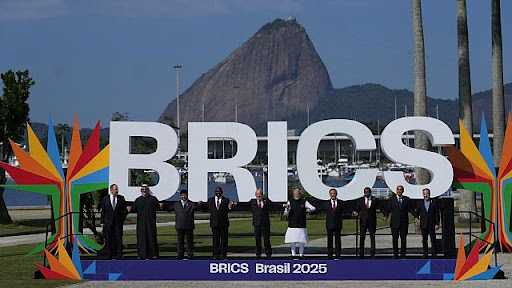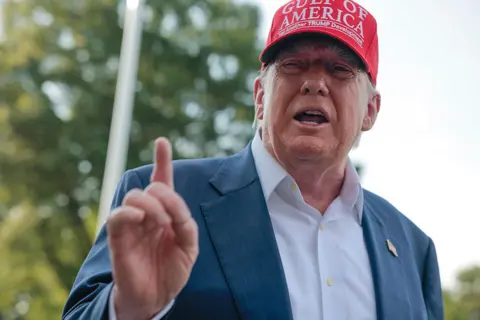U.S. President Donald Trump has reignited global trade tensions by threatening to impose an additional 10% tariff on countries aligning themselves with what he calls the “anti-American policies” of the BRICS bloc. His bold statement, made during a campaign rally in Michigan, has sparked diplomatic pushback and concerns among emerging economies — with China swiftly denouncing the threat as harmful to global cooperation.
Trump Takes Aim at BRICS and ‘Anti-Americanism’
The BRICS bloc — comprising Brazil, Russia, India, China, South Africa, and new members including Iran and Saudi Arabia — has increasingly positioned itself as an economic counterweight to Western influence. Trump, who is mounting a comeback presidential bid for 2026, claimed the group is “undermining American workers” and “building a system designed to exclude the U.S. from global trade decisions.”
“Any country that thinks it can prosper by siding with these anti-American agendas will face consequences — starting with a 10% tariff on all goods coming into the United States,” Trump declared to an enthusiastic crowd.
This potential policy, if implemented, would mark one of the most aggressive protectionist moves in modern American history. Analysts believe it could impact major U.S. trading partners, especially those strengthening ties with China, Russia, or BRICS-aligned economies.
China Reacts Swiftly: Tariffs Will “Harm Everyone”
China, a founding BRICS member and the world’s second-largest economy, issued a scathing response through its Ministry of Commerce.
“Unilateral tariff threats disrupt global supply chains, destabilize markets, and harm all nations involved — including the United States,” said spokesperson Lin Danhua in a press briefing in Beijing.
Chinese officials urged Washington to return to multilateralism and warned of retaliatory measures if such tariffs are enacted.

Beijing has been vocal in expanding BRICS influence, especially after the bloc’s recent enlargement. Trump’s latest rhetoric, they argue, is a “strategic attempt to divide the Global South and isolate China.”
Global Reactions: Unease Among U.S. Allies and Trade Partners
Several emerging economies and U.S. allies have expressed concern over the proposed tariff policy. India and Brazil, both BRICS members and major U.S. trade partners, have not issued formal responses but are reportedly monitoring the situation closely.
Trade experts warn that such tariffs could backfire by increasing costs for American consumers and disrupting key industries — from electronics and pharmaceuticals to agriculture.
“Tariffs of this magnitude would likely trigger a wave of retaliation, leading to a global trade slowdown,” said Carla Reyes, an international trade analyst at the Global Economic Forum.
European Union officials have also expressed unease, noting that the BRICS bloc includes countries that have trade deals with EU nations.
BRICS Expansion: Why Trump Is Concerned
Trump’s remarks come amid growing U.S. anxiety over the BRICS bloc’s expansion and influence. At its last summit, BRICS welcomed six new members and announced plans for a joint payment system to reduce dependence on the U.S. dollar — a move seen as a direct challenge to American financial dominance.
Trump’s “America First” agenda has long targeted global institutions and trade pacts he believes disadvantage U.S. businesses. This latest stance suggests his return to the White House could see renewed trade wars and a rollback of globalization.
What’s Next?
Trump’s tariff proposal remains a campaign promise for now, but it has already triggered international concern. Economists predict that if implemented, it could set off a fresh era of economic nationalism and supply chain realignment.
Also Read: Trump Threatens 25% Tariff on Apple and Samsung Smartphones Not Made in the U.S.

